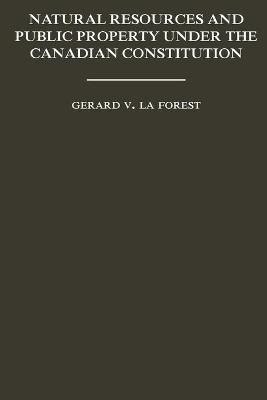
Natural Resources and Public Property Under the Canadian Constitution
Seiten
1967
University of Toronto Press (Verlag)
978-1-4875-8694-2 (ISBN)
University of Toronto Press (Verlag)
978-1-4875-8694-2 (ISBN)
The provisions of the British North America Act and other constitutional instruments relating to natural resources and public property are examined thoroughly in this series of lectures given at the Faulte de droit of the Universite de Montreal.
The controversy aroused by the Supreme Court's decision on offshore mineral rights emphsizes the importance of the public domain in the workings of the Canadian constitution. Public property is important to the provinces not only for its revenues, but also because it provides them with a powerful instrument for control of their economic and political destinies and strengthens their position in relation to federal authorities.
The provisions of the British North America Act and other constitutional instruments relating to natural resources and public property are examined thoroughly in this series of lectures given to doctoral systems at the Faulte de droit of the Universite de Montreal. Professor La Forest studies ownership of mines and minerals, navigable waters, public harbours, fisheries and Indian lands, as well as the currently controversial offshore mineral rights. He notes the political imlications of the partition of proprietary rights and explores the areas of conflict between the federal and provincial governments. Also included is a discussion of the power of expropriation, and, because public property involves public monies, lending and spending powers receive attention.
In these lectures, Professor La Forest traces public domain in Britain from the time when the monarch controlled all the land, to his surrender of this control to parliament in return for a civil list, and to the similar surrender to the legislatures of the British North American colonies in connection with the struggle of responsible government.
The collection of lectures is essential reading for any serious student of the constitution and will be very useful to all who are interested in the increasingly important law of natural resources in Canada.
The controversy aroused by the Supreme Court's decision on offshore mineral rights emphsizes the importance of the public domain in the workings of the Canadian constitution. Public property is important to the provinces not only for its revenues, but also because it provides them with a powerful instrument for control of their economic and political destinies and strengthens their position in relation to federal authorities.
The provisions of the British North America Act and other constitutional instruments relating to natural resources and public property are examined thoroughly in this series of lectures given to doctoral systems at the Faulte de droit of the Universite de Montreal. Professor La Forest studies ownership of mines and minerals, navigable waters, public harbours, fisheries and Indian lands, as well as the currently controversial offshore mineral rights. He notes the political imlications of the partition of proprietary rights and explores the areas of conflict between the federal and provincial governments. Also included is a discussion of the power of expropriation, and, because public property involves public monies, lending and spending powers receive attention.
In these lectures, Professor La Forest traces public domain in Britain from the time when the monarch controlled all the land, to his surrender of this control to parliament in return for a civil list, and to the similar surrender to the legislatures of the British North American colonies in connection with the struggle of responsible government.
The collection of lectures is essential reading for any serious student of the constitution and will be very useful to all who are interested in the increasingly important law of natural resources in Canada.
GERARD V. LA FOREST was Dean of Law at the University of Alberta and was educated at the University of New Brunswick, Oxford (B.A. in Jurisprudence, M.A.), and Yale Law School (LL.M. and J.S.D.). His publications include Disallowance and Reservation of Provincial Legislation, Extradition to and From Canada, and The Allocation of Taxing Power under the Canadian Constitution. He is currently counsel at Stewart McKelvey in Fredericton, New Brunswick
| Erscheinungsdatum | 01.08.2018 |
|---|---|
| Reihe/Serie | Heritage |
| Verlagsort | Toronto |
| Sprache | englisch |
| Maße | 152 x 229 mm |
| Gewicht | 380 g |
| Themenwelt | Naturwissenschaften ► Biologie ► Ökologie / Naturschutz |
| Recht / Steuern ► EU / Internationales Recht | |
| Recht / Steuern ► Öffentliches Recht ► Umweltrecht | |
| Sozialwissenschaften ► Politik / Verwaltung ► Staat / Verwaltung | |
| ISBN-10 | 1-4875-8694-9 / 1487586949 |
| ISBN-13 | 978-1-4875-8694-2 / 9781487586942 |
| Zustand | Neuware |
| Haben Sie eine Frage zum Produkt? |
Mehr entdecken
aus dem Bereich
aus dem Bereich
Lehrbuch zu Grundlagen, Technologie und Praxis
Buch | Hardcover (2022)
Hanser (Verlag)
34,99 €


